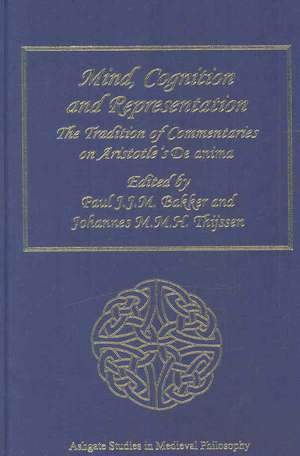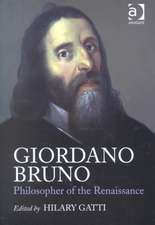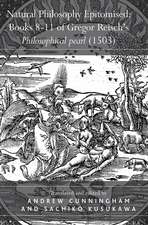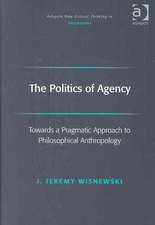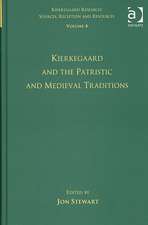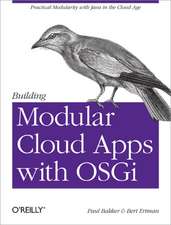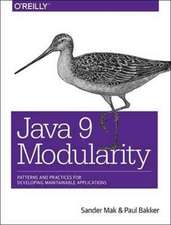Mind, Cognition and Representation: The Tradition of Commentaries on Aristotle’s De anima: Ashgate Studies in Medieval Philosophy
Autor Paul J.J.M. Bakker Editat de Johannes M.M.H. Thijssenen Limba Engleză Hardback – 28 ian 2008
| Toate formatele și edițiile | Preț | Express |
|---|---|---|
| Paperback (1) | 338.33 lei 6-8 săpt. | |
| Taylor & Francis – 26 aug 2016 | 338.33 lei 6-8 săpt. | |
| Hardback (1) | 821.13 lei 6-8 săpt. | |
| Taylor & Francis – 28 ian 2008 | 821.13 lei 6-8 săpt. |
Preț: 821.13 lei
Preț vechi: 1141.19 lei
-28% Nou
Puncte Express: 1232
Preț estimativ în valută:
157.17€ • 170.78$ • 132.11£
157.17€ • 170.78$ • 132.11£
Carte tipărită la comandă
Livrare economică 22 aprilie-06 mai
Preluare comenzi: 021 569.72.76
Specificații
ISBN-13: 9780754630845
ISBN-10: 0754630846
Pagini: 272
Dimensiuni: 156 x 234 x 23 mm
Greutate: 0.52 kg
Ediția:1
Editura: Taylor & Francis
Colecția Routledge
Seria Ashgate Studies in Medieval Philosophy
Locul publicării:Oxford, United Kingdom
ISBN-10: 0754630846
Pagini: 272
Dimensiuni: 156 x 234 x 23 mm
Greutate: 0.52 kg
Ediția:1
Editura: Taylor & Francis
Colecția Routledge
Seria Ashgate Studies in Medieval Philosophy
Locul publicării:Oxford, United Kingdom
Cuprins
Contents: Introduction, Paul J.J.M. Bakker and Johannes M.M.H. Thijssen; The mind-soul problem, Robert Pasnau; A short introduction to James of Douai's philosophy of mind, Guy Guldentops; 'The universal living thing is either nothing or posterior'. Radalphus Brito's Quaestiones super Libros De anima, Mary Sirridge; Making Aristotle modern. John Buridan on psychology and language, Henrik Lagerlund; Self-knowledge and self-representation in later medieval psychology, Jack Zupko; Materialism in the philosophy of mind. Nicholas of Amsterdam's Quaestiones De anima, Olaf Pluta; The renaissance debate on the immortality of the soul. Pietro Pomponazzi and the plurality of substantial forms, Lorenzo Casini; Natural philosophy, metaphysics, or something in between? Agostino Nifo, Pietro Pomponazzi, and Marcantonio Genua on the nature and place of the science of the soul, Paul J.J.M. Bakker; Suárez on cognitive intentions, Tuomo Aho; Attention please! Theories of selective attention in late Aristotelian and early modern philosophy, Cees Leijenhorst; Bibliography; Index.
Notă biografică
Dr Paul Bakker is Lecturer in the Faculty of Philosophy, Centre for Medieval and Renaissance Natural Philosophy, Raboud University, Nijmegen, The Netherlands. Johannes Thijssen is Professor of Philosophy and Director of the Center for Medieval and Renaissance Natural Philosophy, Raboud University, Nijmegen, The Netherlands.
Descriere
This book traces the historical roots of the cognitive sciences and examines pre-modern conceptualizations of the mind as presented and discussed in the tradition of commentaries on Aristotle's De anima from 1200 until 1650. It explores medieval and Renaissance views on questions which today would be classified under the philosophy of mind - questions regarding the identity and nature of the mind and its cognitive relation to the material world. It also explores the development of scholastic ideas, concepts, arguments, and theories in the tradition of commentaries on De anima, and their relation to modern philosophy. By placing key issues in their philosophico-historical context, not only is due attention paid to Aristotle's own views, but also to those of less popular medieval and Renaissance commentators.
